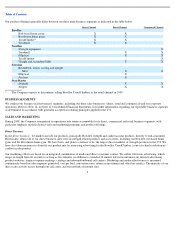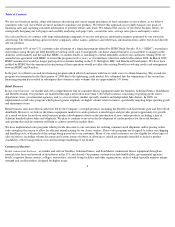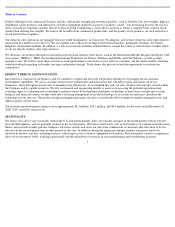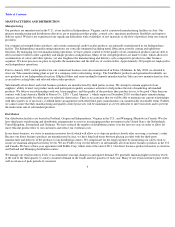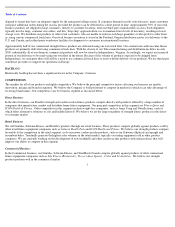Nautilus 2008 Annual Report Download - page 17
Download and view the complete annual report
Please find page 17 of the 2008 Nautilus annual report below. You can navigate through the pages in the report by either clicking on the pages listed below, or by using the keyword search tool below to find specific information within the annual report.
Table of Contents
These trends and factors could harm our business, operating results, financial condition and cash flows in any particular period.
Our operating expenses and portions of our costs of revenues are relatively fixed, and we may have limited ability to reduce expenses
sufficiently in response to any revenue shortfalls.
Many of our operating expenses are relatively fixed. We may not be able to adjust our operating expenses or other costs sufficiently to
adequately respond to any revenue shortfalls. If we are unable to reduce operating expenses or other costs quickly in response to any revenue
shortfall, it would negatively impact our operating results, financial condition and cash flows.
If we are unable to anticipate consumer preferences or to effectively develop, market and sell future products, our future revenues and
earnings could be adversely affected.
Our future success depends on our ability to develop, or acquire the rights to, and effectively produce, market, and sell new products that create
and/or respond to new and evolving consumer demands. Accordingly, our net sales and profitability may be harmed if we are unable to develop,
or acquire the rights to new or different products that satisfy consumers’ preferences. In addition, any new products that we market may not
generate sufficient net sales to recoup their development, acquisition, production, marketing and selling and other costs.
A delay in getting foreign sourced products through customs in a timely manner could result in cancelled orders and unanticipated
inventory accumulation.
Many of our imported products are subject to duties, tariffs or quotas that affect the cost and quantity of various types of goods imported into the
U.S. or our other markets. The countries in which our products are produced or sold may adjust or impose new quotas, duties, tariffs or other
restrictions. Further, our business depends on our ability to source and distribute products in a timely manner. As a result, we rely on the free
flow of goods through open and operational ports worldwide. Labor disputes at various ports create significant risks for our business, particularly
if these disputes result in work slowdowns, lockouts, strikes or other disruptions during our peak importing seasons. Any of these factors could
have a material adverse effect on our business, potentially resulting in reduced revenues and earnings, cancelled orders by customers and/or
unanticipated inventory accumulation.
Unpredictable events and circumstances relating to our international operations, including our use of foreign manufacturers, could
result in cancelled orders, unanticipated inventory accumulation, and reduced revenues and earnings.
A portion of our revenue is derived from sales outside the U.S. For the year ended December 31, 2008, international sales represented
approximately 22% of our consolidated net sales. In addition, a substantial portion of our products are manufactured outside of the
U.S. Accordingly, our future results could be materially adversely affected by a variety of factors pertaining to international trade, including:
changes in a specific country’s or region’
s political or economic conditions; trade restrictions; import and export licensing requirements; changes
in regulatory requirements; additional efforts to comply with a variety of foreign laws and regulations; and longer payment cycles in certain
countries, thus requiring us to finance customer purchases over
13
•
Seasonality of markets, such as the direct consumer and retail consumer markets, which vary quarter
-
to
-
quarter and are influenced by
outside factors such as overall consumer confidence and the availability and cost of television advertising time;
•
The effectiveness of our media and advertising programs; and
•
Customer consolidation in our retail or commercial segments, or the bankruptcy of any of our larger customers.


